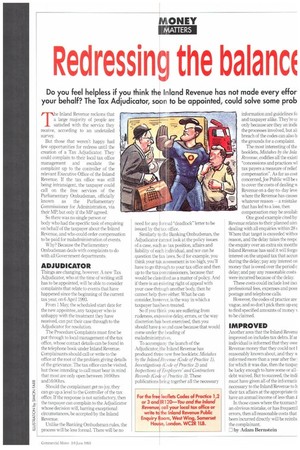Redressing the balana
Page 45

If you've noticed an error in this article please click here to report it so we can fix it.
Do you feel helpless if you think the Inland Revenue has not made every effor your behalf? The Tax Adjudicator, soon to be appointed, could solve some prob
The Inland Revenue reckons that a large majority of people are satisfied with the service they I receive, according to an undetailed survey.
But those that weren't happy had few opportunities for redress until the creation of a Tax Adjudicator. They could complain to their local tax office management and escalate the , complaint up to the controller of the relevant Executive Office of the Inland Revenue. If the tax office was still being intransigent, the taxpayer could call on the free services of the Parliamentary Ombudsman, officially known as the Parliamentary Commissioner for Administration, via their MP, but only if the MP agreed.
So there was no single person or body who had the specific task of enquiring on behalf of the taxpayer about the Inland Revenue, and who could order compensation to be paid for maladministration of events.
Why? Because the Parliamentary Ombudsman deals with complaints to do with all Government departments.
ADJUDICATOR
Things are changing, however. A new Tax Adjudicator, who at the time of writing still has to be appointed, will be able to consider complaints that relate to events that have happened since the beginning of the current tax year, on 6 April 1993.
From I May, the scheduled start date for the new appointee, any taxpayer who is unhappy with the treatment they have received, can put their case through to the Adjudicator for resolution.
The Procedure Complaints must first be put through to local management of the tax office, whose contact details can be found in the telephone book under Inland Revenue. Complainants should call or write to the office at the root of the problem giving details of the grievance. The tax office can be visited, but those intending to call must bear in mind that most are only open between 10:COhrs and16:00hrs.
Should the complainant get no joy, they can go up a level to the Controller of the tax office. If the response is not satisfactory, then the taxpayer can complain to the Adjudicator whose decision will, barring exceptional circumstances, be accepted by the Inland Revenue.
Unlike the Banking Ombudsman rules, the process will be less formal. There will be no need for any formal "deadlock" letter to be issued by the tax office.
Similarly to the Banking Ombudsman, the Adjudicator cannot look at the policy issues of a case. such as tax position, affairs and liability of each individual, and nor can he question the tax laws. So if for example, you think your tax assessment is too high. you'll have togs through to your tax office and then up to the tax commissioners, because that would be classified as a matter of policy. And if there is an existing right of appeal with your case through another body, then he cannot help there either. What he can consider, howevt r, is the way in which a taxpayer has been treated.
So if you think you are suffering from rudeness, excessive delay, errors, or the way discretion has been exercised, then you should have a sound case because that would come under the heading of maladministration.
To accompam the launch of the Adjudicator, the Inland Revenue has produced three new free booklets: Mistakes by the inland Repenue (Code of Practice 1), Investigations (Code of Practice 2) and Inspections of Employers' and Contractors Records (Code of Practice 3). These publications bring together all the necessary information and guidelines fo and taxpayer alike. They're u; only because are they an indk the processes involved, but al! breach of the codes can also b the grounds for a complaint.
The most interesting of the booklets. Mistakes by the Ink Revenue, codifies all the existi "concessions and practices wl tax payers a measure of relief compensation". As far as cost concerned, Joe Public will be t to cover the costs of dealing v1/4 Revenue on a day-today leve where the Revenue has cause whatever reason— a mistake that has led to a loss, then compensation may be availab One good example cited by Revenue relates to their planned aim dealing with all enquiries within 28 Where that target is exceeded withoi reason, and the delay takes the respc the enquiry over an extra six months Inland Revenue has said it will forgo interest on the unpaid tax that accun during the delay; pay any interest on money that is owed over the period c delay; and pay any reasonable costs were incurred because of the delay.
These costs could include lost inc professional fees, expenses and poss postage and telephone calls.
However, the codes of practice are vague, and so don't pick them up ex; to find specified amounts of money s to be claimed.
IMPROVED
Another area thatthe Inland Revenu improved on includes tax debts. If at individual is informed that they owe Revenue money that they could not I reasonably known about, and they ss informed more than a year after the for which it was due, then the taxpa] be lucky enough to have some or all debt waived. But to succeed, the indi must have given all of the informant necessary to the Inland Revenue to h their tax affairs at the appropriate tit have an annual income of less than In those cases where the taxman 17 an obvious mistake, or has frequent] errors, then all reasonable costs that been incurred directly will be reimbi the complainant.
by Adam Bernstein




















































































